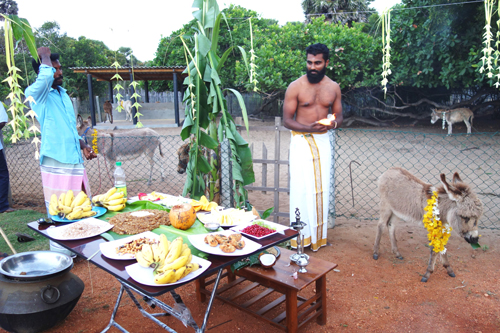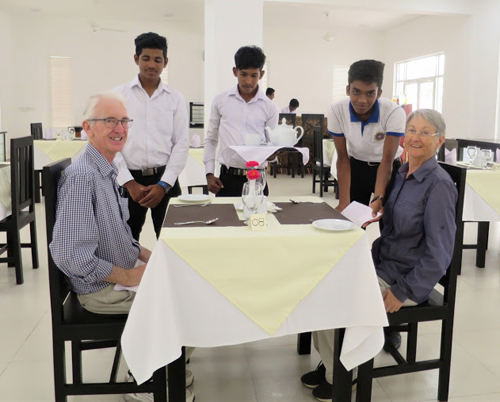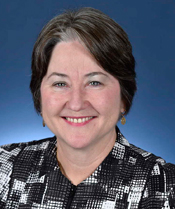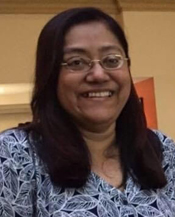Forging close bonds between Australia and Sri Lanka

Volunteer Abhinayan Kugendran at a community event in Thailankudiyiruppu village on Mannar island, on Mattu Pongal day, the third day of the Pongal festival. On this day, people pay their respects to their livestock and Bridging Lanka had designated it Kaluthai Pongal (kaluthai meaning donkey) to change the negative perception towards Mannar’s donkeys
They heard of the need, they came across the seas, they fanned out across the country, mingled, integrated and helped people in diverse settings.
Due to unforeseen circumstances which came in the form of the COVID-19 pandemic this year, they were compelled to leave our shores with heavy hearts.
However, one of them could not bear to do so and has come back on his own and was in the 10th day of mandatory quarantine at Beruwela when the Sunday Times spoke to him. He was due to head to ‘Bridging Lanka’ in the dusty and arid town of Mannar on Friday.
This is while others are “longing” to return and some have overcome these challenging times by connecting with Sri Lankans at the grassroots through Zoom.
Twelve volunteers including 28-year-old Abhinayan Kugendran (fondly known as Abs) are part of the vibrant Australian Volunteers Program (AVP) which has been forging close bonds between Sri Lanka and Australia.
Born in Sri Lanka, but having lived in Sydney all his life, Abs came to Sri Lanka on holiday in 2018. While travelling to the north, he decided to spend a day or two at Bridging Lanka (an NGO involved in a livelihood project for vulnerable women and also looking after the welfare of donkeys among other things) as he had met its head over in Australia.

Robyn and Stephen at a practice session with restaurant students
The few days, became a few weeks and then a few months and after hearing about the AVP, Abs (who has a civil engineering and project management degree) applied and continued as a volunteer at Bridging Lanka as its Project Manager on its ‘Towards Religious Harmony Programme’. Then the new coronavirus hit and his two-month stint as part of the AVP ended with the repatriation of the volunteers.
Wife-and-husband duo Robyn (63) and Stephen Davis (66) who live in Brisbane are yearning to get back to Galle. Though they had learnt about Ceylon in school and always drunk Ceylon tea, they had never visited this country, until they arrived in this bustling southern town through the AVP.
The couple who is passionate about vocational training in educating and developing young people, had come here in June 2019, using Galle as their base to visit over a dozen vocational colleges from Hikkaduwa to Tallala, Matara to Elpitiya, Boossa and Baddegama, Niyagama to Urawatta and Galle itself.
As an English teacher trainer, Robyn supported, encouraged and assisted local English teachers in vocational colleges to provide practical, spoken and listening activities that would be applicable in the workplace, while also conducting demonstration lessons.
“Real world, real work,” is one of many instances of her work at the Ahangama Hotel School, where reception students went through the paces of taking hotel bookings in person or over the phone and check-in procedures in English using simulated passports and credit cards, while students training as stewards practised taking orders in English in a restaurant.
Stephen, meanwhile, with his information technology (IT) skills, had set-up Google Drive as a location for learning materials and activities that vocational English teachers in the country could access using their computers or mobile phones.
Robyn and Stephen relate the tale of a class of welding students at a vocational college taking cover behind their equipment as chatting in English was not a favourite activity but the moment Stephen brought up cricket – “well, they became immediately engaged in the chat and their English skills surprised us all”.
Pointing out that vocational education is all about people and the community, Stephen says that they lived in a two-bedroom annex in a family home, sharing birthdays and other celebrations. Many were the ways including some Sinhala lessons in which people in Galle helped them. They travelled by train, bus, three-wheeler or walked, which gave them a better understanding of the culture.
Bus-rides were “interesting” and they never felt unsafe, quickly learning, however, not to look out the front of the bus to see which cow, car, three-wheeler, bus, truck or dog was on the middle of the road.
For this couple, the “climate – heat and rain combination – we had never experienced before, learning from the locals that when it rains, you should shelter under an awning or roof, wait 10 minutes and then it will stop so that you continue on your journey”.
While Robyn and Stephen are still very much in touch through email with some teachers here, on a lighter note they say that back home they are still counting the ways coconut can be used in food, drinks and cooking.
Meanwhile, the AVP has adapted and put in place a remote volunteer, Katy Mackey, who is supporting the Jaffna Social Action Centre (JSAC)through Zoom, Skype, WhatsApp and email, as more such volunteers are in the pipeline.
| All about AVP and going virtual with volunteering | |
 Amanda Jewell - Acting Australian High Commissioner The Australian Government has supported skilled international volunteering for over 60 years in 26 countries, including Sri Lanka and on International Volunteer Day (December 5),we celebrate the connections and friendships between Australian volunteers and their Sri Lankan hosts, says the acting Australian High Commissioner of Sri Lanka and Maldives, Amanda Jewell. In Sri Lanka, the Australian Volunteers Program (AVP) supports Australian teachers, doctors, information technology advisers, skills programmers, business analysts and many other experienced, enthusiastic volunteers to work with Sri Lankan government agencies, civil society organizations and think tanks. Ms. Jewell reiterates that in addition to assisting Sri Lanka’s development, volunteering results in deep, long-lasting connections between the two countries that immeasurably strengthen their relationship. “We are working hard to ensure the core benefits of volunteering are not lost in this most difficult of years. Even though we have temporarily shifted in 2020 from on-the-ground volunteer placements to virtual, online arrangements, the AVP is managing ‘remote volunteering’ in a manner that enables both volunteers and hosts to have rich, rewarding experiences,” she says.  Ruvanthi Sivapragasam Pointing out that supporting local partner organizations to build their capacity and resilience and to maintain their global interconnectivity in the face of COVID-19 are significant challenges, the acting High Commissioner adds that with its strong network of partner organizations and deep engagement with Sri Lanka, the AVP is well placed to meet those challenges. The Country Program Manager Ruvanthi Sivapragasam says that the AVP, funded by the Department of Foreign Affairs and Trade of the Australian Government, contributes unique experiences, networks and ideas to volunteer assignments and communities and works with a variety of partner organizations such as government departments, non-governmental organizations (NGOs) and UN agencies. “These volunteers come from different sectors and from across Australia and apply for roles that match their professional skills, with locally-led capacity development being the core of the program. We support local communities, organizations and governments drive and own their solutions,” she says. Ms. Sivapragasam says that with the decision to repatriate the volunteers due to the unprecedented impact of COVID-19, partner organizations are being supported by ‘remote volunteering’ which allows volunteers to complete a short-term remote assignment and the ‘Impact Fund’ which provides eligible partner organizations access to a small grant to help them and their communities respond to and recover from the impacts of COVID-19. Among the volunteers who have been repatriated are a psychologist who was working with the Special Education Department in Kilinochchi; a digital marketing adviser at the Hambantota District Chamber of Commerce; and a disaster management adviser at the World Food Program, Colombo office. Ms. Sivapragasam is aided by Program Support and Administration Officer, Zahra Farook.
|


